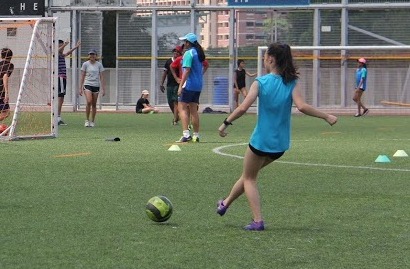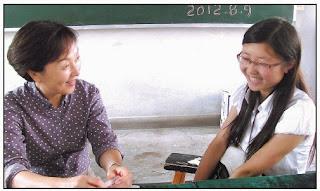appropriate
adjective
əˈprəʊprɪət/
1.
suitable or proper in the circumstances.
Recently, I took a trip to Bangalore, in the south of India to spend a few days with my brother who goes to a boarding school in the city. I spent 6 days, I stayed with my aunt, her two sons, my uncle and my brother who took a few days off school to stay with us.
Me, personally, I'm very much into women rights, it's a matter that is very personal and very important to me. I work in a global service called Daraja Academy which partners with a girls school in Kenya. But mainly, I think that equal rights across genders is important. This trip that I took really opened my eyes to the gender discrimination that exists in my own home country of India.
First incident that I want to talk about is the current "clothing policy" that exists for girls in Bangalore and other cities across India. Living in Singapore, I have had the privilege of being able to wear whatever I want. I have been able to wear shorts or tank tops or dresses without someone saying that it is inappropriate. But even if, there are still "dress codes" in my school that exist only for the girls. There still is a very gender biased dress code in Singapore, which is a fairly westernized country with little gender discrimination.
It was a Friday, my mother, brother and I were getting ready to visit my moms brother, his wife and son. I got dressed and I put on a maroon dress with small black dots all around it. It was fairly long, ending right at my knee, and it had spaghetti straps. Also, I put on a black cardigan that covered my arms and shoulders well because I was used to being told that what I was wearing was not suitable for India. I was taught from a young age to cover up my body, especially in India. After putting the outfit on, I thought that I was well covered and I felt comfortable in what I was wearing.
But regardless of my feelings, my mother told me, gently but sternly that I couldn't leave the house in that. Immediately I got annoyed, I was happy with my outfit choice and I wanted to wear it out. But she insisted that I change. So I did, just to make her happy but I wasn't happy myself.
India, no secrets, is known for its high rates of rape and sexual assault against women, though it is decreasing slowly, it still is there. It has become a more clear fact that women cannot wear what they please without having a man look at them as a sexual toy. It is known to women that they must cover themselves up and to not dress "inappropriately" so men look at them with respect. I'm not saying that this applies to every country, because it doesn't but it does to certain countries, and India is definitely one of them.
But my problem is that women get blamed for feeling comfortable. I've read many YouTube comments, tweets, comments on news reports about sexual assaults, and quite a few people have said things like, "she was asking for it, dressing like that", "look at what she's wearing, of course she was going to get raped" and other comments that I wouldn't like to show in this post.
Are these people really going to turn the blame around and say that a woman was asking to get raped for wearing clothes she is comfortable in? Are they saying that if a woman was wearing a short skirt or a short dress, that makes sexual assault okay? Because that's exactly what it looks like.
If its hot outside, if it's 30 degrees celsius outside, why should I spend the day wearing jeans and a full sleeved top when I can feel comfortable and wear shorts and a tee-shirt?
Girls should be taught to love their bodies and feel comfortable in what they wear. If a girl feels comfortable in a short skirt, then she should be allowed to wear one and not be constantly shamed for it. The idea of clothes being a distraction is purely underestimating the male population. If a boy is distracted by a girls shoulders or a girls thighs, and cannot focus of his own life, then that is his problem. It's not the girls fault. By telling girls that it is their fault, you are indirectly contributing to rape culture with victim blaming.
Why are there rules that girls can't wear these things but boys can? Basically, you are telling a girl that because they're a girl, they have cover up. You punish girls by saying that "they're a distraction". You are saying that a boy's education is more important than a girl's. Girl should not be shamed and humiliated and held responsible for boys' reactions to their bodies. Girls are more than distractions. Why must we point the finger of blame to girls when they are viewed sexually? Boys can control themselves well enough and if they can't, then it's their problem, not mine. We should teach boys that girls are not sexual objects instead of telling girls to cover up.
We should teach girls to be confident. So many people say that they are all for gender equality and they think that women deserve to be treated equally and yet, they do nothing to fix the daily issues that women face.
Practice what you preach, think before you speak and stop the discrimination.







